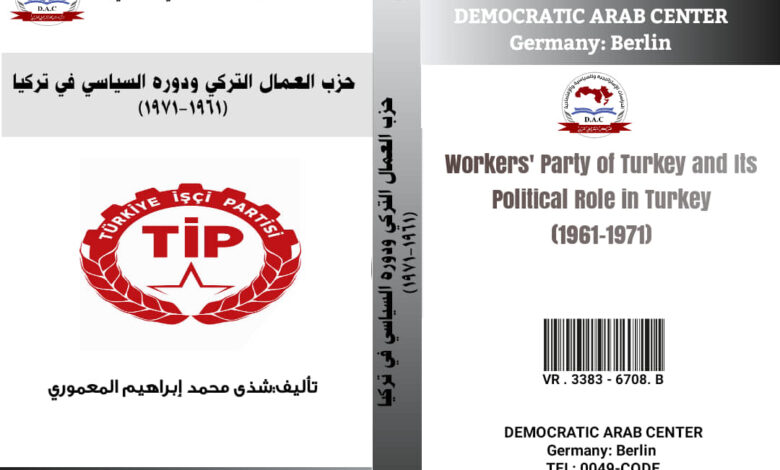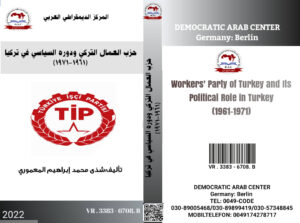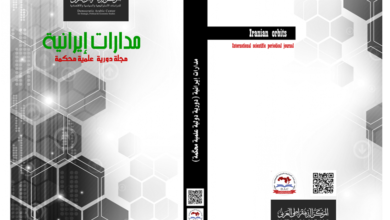حزب العمال التركي ودوره السياسي في تركيا 1961-1971
Workers´ Party of Turkey and Its Political Role in Turkey 1961-1971

تأليف : شذى محمد إبراهيم المعموري – وزارة التربية العراقية/ المُديرية العامة لتربية بغداد / الكرخ الثانية
نسخة “pdf”-
حزب العمال التركي ودوره السياسي في تركيا 1961-1971
الطبعة الأولى “2022″ –من كتاب: – حزب العمال التركي ودوره السياسي في تركيا ” 1961-1971 “
جميع حقوق الطبع محفوظة #المركز_الديمقراطي_العربي ولا يسمح بإعادة إصدار هذا الكتاب أو اي جزء منه أو تخزينه في نطاق إستعادة المعلومات أو نقله بأي شكل من الأشكال، دون إذن مسبق خطي من الناشر .
تقديم :
شهدت تركيا تطورات مهمة بعد الحرب العالمية الثانية 1939-1945 والتي كان من اهمها تشويه سمعة الانظمة السياسية القائمة على نظام حكم الحزب الواحد, وإحياء الديمقراطية بتعدد الأحزاب بأقامة انتخابات حرة , وقد طالت تلك التغيرات تركيا, وبعد انتهاء الحرب العالمية الثانية , وما تركته من أثار على كافة الاصعدة, وما شهدته من انتصار للديمقراطيات الغربية وانهزام النظم الفاشية والنازية, فأن تركيا لم تكن بعيدة عن تلك التطورات السياسية التي أدت إلى حدوث نقلة في التاريخ السياسي الحديث لتركيا, اذ أقرت نظاما برلمانيا يقوم على تعدد الأحزاب منذ عام 1945, وسمحت بالتعددية الحزبية, وعموماً فأن التعددية الحزبية في تركيا لم تأخذ كامل ابعادها إلا بعد اصدار دستور عام 1961 الذي أتاح حرية أوسع للعمل السياسي والمهني, وضمن حقوق المعارضة السياسية, وأعطى الأحزاب السياسية الصغيرة فرصة اوسع للمشاركة في الحكم والتي كانت من نتائجه تأسيس حزب العمال التركي.
وتأتي اهمية الموضوع من جهة كونه يدرس العوامل التي مكنت الحزب وهو حزب يساري من البقاء بشكل قانوني في الوقت الذي كانت فيه الحركات اليسارية تتعرض للقمع وحضر انشطتها السياسية, كما تم قمع اليسار وعد الحركات الاشتراكية خطراً, تمكن الحزب من أعداد برنامجه السياسي.
وسبب اختيار موضوع ( حزب العمال التركي ودوره السياسي في تركيا 1961-1971) هي قلّة الدراسات العربية التي تناولته , فضلاً عن الرغبة في توضيح مكانة واهمية الحزب في الساحة السياسية التركية, لكونه أول حزب يساري اشتراكي استطاع الوصول إلى البرلمان التركي من خلال شعبيته في أوساط الشعب التركي , وابرز العوامل التي أدت إلى نجاح هذا الحزب.
ومما هو جدير بالذكر أن تحديد نطاق الدراسة بالمدة 1961-1971 جاء لعدة أسباب كان اهمها أن المدة المشار إليها شهدت أحداثاً مهمة, منها اعلان دستور عام 1961, وتأسيس حزب العمال التركي, وانقلاب عام 1971, وبسبب الأحداث السياسية الداخلية انتهى نشاط الحزب بانقلاب عام 1971, واغلاقه, اذ استمر عشر سنوات.
جرت كتابة الدراسة وفق المنهج التاريخي التحليلي, الذي لا يقتصر على سرد الاحداث والوقائع التاريخية وربطها, بل حاول مناقشة الاحداث وتحليل الأسباب والنتائج.
إن اشكالية الدراسة تتعلق بمحاولة فهم دور حزب العمال التركي ومعالجته للأوضاع السياسية , ولتتبع هذه الاشكالية طرحنا عدة تساؤلات منطقية منها :
- 1-ماالعوامل التي ساعدت حزب العمال التركي وهو أول حزب اشتراكي يدخل المجلس الوطني التركي الكبير؟
- 2- هل واجه الحزب صعوبات في ايجاد كيان خاص به بمعزل عن اليسارية والشيوعية؟
- 3- وما مدى تأثير قادة الحزب على توجهاته وافكاره السياسية والاقتصادية؟
- 4- وما مدى انعكاس الصراع السياسي على اداء الحزب؟ وهل كان طرفا في ايجاده؟
وللإجابة عن تلك الاسئلة المطروحة تم تقسيم الدراسة على أربعة فصول فضلا عن مقدمة وخاتمة , قدم الفصل الاول والذي جاء بعنوان (تطور الاوضاع السياسية في تركيا 1945-1961) وتضمن اربعة مباحث, حيث تناول المبحث الاول القاء الضوء على التطورات السياسية الداخلية في تركيا بعد الحرب العالمية الثانية التي أدت إلى انهاء نظام الحزب الواحد والسماح بالتعددية الحزبية في تركيا عام1945, وتناول المبحث الثاني تأسيس الاحزاب والجمعيات اليسارية التركية 1946-1960, أما المبحث الثالث فقد تناول الصراع السياسي بين الاحزاب السياسية والذي أدى إلى تدخل الجيش وحدوث اول انقلاب عسكري في 27 أيار 1960, في حين تضمن المبحث الرابع اعلان دستور عام 1961, والذي سمح بالنشاط الحزبي والحرية السياسية بالنسبة للأحزاب اليسارية .
أما الفصل الثاني والذي حمل عنوان (تأسيس حزب العمال التركي ونشاطه السياسي 1961-1971), تناول المبحث الاول تأسيس حزب العمال التركي عام 1961, وتوجهاته الفكرية وبرنامجه السياسي , وتناول المبحث الثاني محمد علي ايبار ورئاسته للحزب عام 1962, اما المبحث الثالث فقد تمت دراسة مؤتمرات الحزب, والمبحث الرابع نشاط الحزب السياسي ودوره في الانتخابات.
خصص الفصل الثالث وعنوانه (موقف حزب العمال من القضايا الداخلية في تركيا 1961-1971), وتناول المبحث الاول موقف الحزب من الحركات اليسارية التركية , اما المبحث الثاني فقد تناول المشكلة الكردية وموقف الحزب منها , في حين تناول المبحث الثالث القضية القبرصية .
اما الفصل الرابع فخصص لدراسة (موقف حزب العمال التركي من القضايا الخارجية 1961-1971), فتناول المبحث الاول موقف الحزب من الاتفاقيات الثنائية وحلف الشمال الاطلسي , اما المبحث الثاني فقد وضح موقف حزب العمال التركي من عضوية تركيا في السوق الاوربية المشتركة , في حين اخذ المبحث الرابع موقف حزب العمال التركي اتجاه احداث تشيكسلوفاكيا عام 1968.
SHATHA MOHAMMED IBRAHIM AL-MAMOORI
Abstract
Turkey witnessed important developments after World War II 1939-1945, the most important of which was the discrediting of political systems based on the one-party rule system, and the revival of democracy by multi-partyism by holding free elections. At all levels, and the victory of Western democracies and the defeat of the fascist and Nazi regimes, Turkey was not far from those political developments that led to a shift in the modern political history of Turkey, as it approved a multi-party parliamentary system since 1945, and allowed partisan pluralism. In general, party pluralism in Turkey did not take its full dimensions until after the issuance of the 1961 constitution, which allowed greater freedom for political and professional work, and within the rights of the political opposition, and gave small political parties a broader opportunity to participate in the government, and one of the results of which was the establishment of the Turkish Workers’ Party.
The importance of the subject comes from the fact that it studies the factors that enabled the party, which is a leftist party, to legally survive at a time when leftist movements were subjected to repression and attended their political activities, and the left was repressed and considered socialist movements a threat. The party was able to prepare its political program.
The reason for choosing the topic (The Turkish Workers’ Party and its Political Role in Turkey 1961-1971) is the lack of Arab studies that dealt with it, as well as the desire to clarify the position and importance of the party in the Turkish political arena, as it is the first socialist leftist party that was able to reach the Turkish Parliament through its popularity among the circles The Turkish people, and the most prominent factors that led to the success of this party.
It is worth noting that defining the scope of the study for the period 1961-1971 came for several reasons, the most important of which was that the aforementioned period witnessed important events, including the declaration of the 1961 constitution, the establishment of the Turkish Workers’ Party, and the coup of 1971, and because of the internal political events, the party’s activity ended with the coup of 1971 , and closed, as it lasted ten years.
The study was written according to the historical-analytical method, which is not limited to narrating and linking historical events and facts, but rather tries to discuss the events and analyze the causes and results.
The problem of the study is related to trying to understand the role of the Turkish Workers’ Party and its treatment of the political situation. To follow this problem, we raised several logical questions, including them. In order to answer these questions, the study was divided into four chapters, in addition to an introduction and conclusion. The second world, which led to the end of the one-party system and allowing partisan pluralism in Turkey in 1945, and the second topic dealt with the establishment of Turkish left-wing parties and associations 1946-1960, and the third topic dealt with the political conflict between political parties, which led to the intervention of the army and the occurrence of the first military coup on May 27 1960, while the fourth topic included the declaration of the 1961 constitution, which allowed partisan activity and political freedom for left-wing parties.
As for the second chapter, which was titled (The Founding of the Turkish Workers’ Party and its Political Activity 1961-1971), the first topic dealt with the establishment of the Turkish Workers’ Party in 1961, its intellectual orientations and its political program, and the second topic dealt with Mehmet Ali Ibar and his leadership of the party in 1962, while the third topic was studied Party conferences, and the fourth topic, the political party’s activity and its role in the elections.
The third chapter, entitled (The Labor Party’s position on internal issues in Turkey 1961-1971), was devoted to the first topic, the party’s position on the Turkish leftist movements, and the second topic dealt with the Kurdish problem and the party’s position on it, while the third topic dealt with the Cyprus issue.
As for the fourth chapter, it was devoted to a study (the position of the Turkish Workers’ Party on foreign issues 1961-1971), the first section dealt with the party’s position on bilateral agreements and the North Atlantic Treaty, while the second topic clarified the position of the Turkish Workers’ Party on Turkey’s membership in the European Common Market, while taking The fourth topic is the position of the Turkish Workers’ Party towards the events of Czechoslovakia in 1968.
- الناشر: المركز الديمقراطي العربي للدراسات الإستراتيجية والسياسية والاقتصادية





